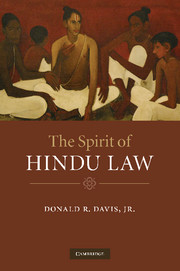Book contents
- Frontmatter
- Contents
- List of tables
- Preface
- Acknowledgments
- List of abbreviations
- Introduction (dharmaśāstra)
- 1 Sources and theologies (pramāṇa)
- 2 Hermeneutics and ethics (mīmāṃsā)
- 3 Debt and meaning (ṛṇa)
- 4 Persons and things (svatva)
- 5 Doubts and disputes (vyavahāra)
- 6 Rectitude and rehabilitation (daṇḍa)
- 7 Law and practice (ācāra)
- Conclusion
- Bibliography
- Index
6 - Rectitude and rehabilitation (daṇḍa)
Published online by Cambridge University Press: 26 February 2010
- Frontmatter
- Contents
- List of tables
- Preface
- Acknowledgments
- List of abbreviations
- Introduction (dharmaśāstra)
- 1 Sources and theologies (pramāṇa)
- 2 Hermeneutics and ethics (mīmāṃsā)
- 3 Debt and meaning (ṛṇa)
- 4 Persons and things (svatva)
- 5 Doubts and disputes (vyavahāra)
- 6 Rectitude and rehabilitation (daṇḍa)
- 7 Law and practice (ācāra)
- Conclusion
- Bibliography
- Index
Summary
Punishment is the practical tool for bringing law into the world. Theologically, but also theoretically, dharma enters the world through the Veda and the unbroken transmission of its dharma down to the present in the learned tradition. However, via an indirect theological route, dharma enters the world of practice through the punishments of a ruler. The importance of the ruler thus extends well beyond responsibility for the legal procedures discussed in Chapter 5. In fact, there is little doubt that Hindu law viewed protection of the people and the promotion of the system of castes and life-stages as the ruler's main duties. Punishment is the root and the means of such protection and promotion.
The elaboration and specification of punishments for specific crimes is extraordinarily detailed in the Hindu legal texts. To examine the spirit of the Hindu legal view of punishment, however, we must first examine the general description and theories of punishment presented in the texts. The relationship of the general theories to the system of dharma and to political ideas will then reveal a view of punishment that supports both religious and political ends. Rather than focusing on the effects of punishment only at the level of the state, however, we will also examine its role in the system of castes and life-stages. Of all the usual elements of law, punishment is the one that connects most obviously to what a legal system can do to us, but the Hindu tradition emphasizes the fact that punishment does a great deal for us as well.
- Type
- Chapter
- Information
- The Spirit of Hindu Law , pp. 128 - 143Publisher: Cambridge University PressPrint publication year: 2010



